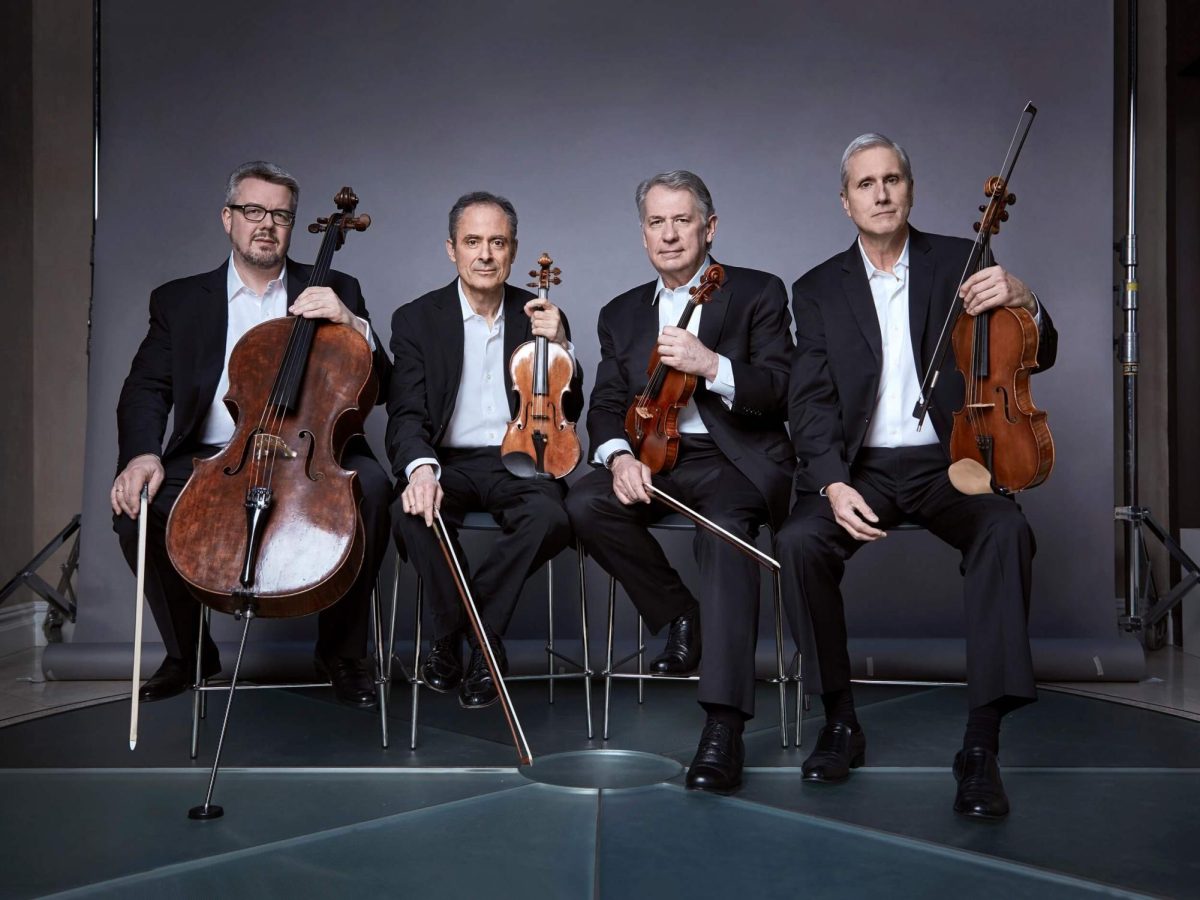Few chamber music groups are as big of a household name as the Emerson String Quartet, even among non-musicians. With nine GRAMMYs and countless accolades to their name, the Emerson Quartet is considered by many to be the gold standard in chamber music. After 47 years of performing, recording, and teaching masterclasses, the Emerson Quartet has begun their farewell tour and will be performing at Finney Chapel this Friday, Sept. 22 at 7:30 p.m.
There are a number of factors that set the Emerson Quartet apart from other leading American quartets. They were founded in 1976 as a student ensemble at the Juilliard School. Unlike some other quartets that came out of Juilliard around the same time, such as the Tokyo Quartet, Emerson has almost entirely maintained its original lineup since its founding, with only one personnel change.
In addition to producing an immense number of recordings in the last four decades, members of the Emerson Quartet have been able to build a deep and lasting musical relationship, one that’s nearly unrivaled in the chamber music industry. Over nearly half a century of playing, they’ve developed a level of intimacy that makes their music instantly recognizable.
“Even though we’re all different kinds of people and players, the music always comes first,” Emerson Quartet violist Lawrence Dutton said. “We’ve been working hard … to really understand this music and make it our own and play it as well as possible.”
Dutton also offered some context as to why the group has decided to end their long run, a question that has been continuously raised since the announcement of their farewell tour.
“To play Beethoven’s quartets, or to play any of this repertoire, takes so much energy, so much concentration,” Dutton said. “It’s a sport, really. We feel like we’re still playing well, and we really want to go out that way.”
According to Dutton, the group’s decision to disband was also prompted by the COVID-19 pandemic in 2020.
Associate Professor of Viola and Chamber Music Kirsten Docter played with members of the Emerson Quartet a number of times before joining the Oberlin faculty. She was also a member of the award-winning Cavani String Quartet for 23 years. Docter shared her thoughts on the importance of Emerson in a conservatory context overall and reflected on the group’s disbandment.
“They’re just a really clean ensemble,” Docter said. “There’s a ton of great quartets who have a lot of great recordings, but Emerson just has so many recordings, and they’re all very pristine. I really appreciate the individual ability of each musician and how they really bring their own voice to their recordings and performances.”
Emerson is also unique in terms of instrumentation. Most string quartets are composed of a first violin, second violin, viola, and cello. In Emerson, the two violinists, Philip Seltzer and Eugene Drucker, alternate chairs, which enables the group to create seamless blends in their arrangements and tailor each piece to Seltzer and Drucker’s unique strengths.
Conservatory third-year and violist Lily Bronson expressed an appreciation for Emerson’s strong stage presence and flawless performances.
“One thing that’s really important in a string quartet is having a big sound presence, even though viola is usually secondary,” said Bronson. “I’ve been trying to emulate that from Emerson for a long time.”
At the Conservatory, there is widespread love for the Emerson Quartet. Most Conservatory students — including non-string majors — are at least familiar with the group, if not devout fans.
“Everyone knows about the Emerson Quartet,” Bronson said. “Everyone has listened to their recordings. I can’t speak for everyone saying that they’re their favorite quartet, but I think everyone generally has a great level of respect for them.”
Because of their clarity and attention to detail, Emerson’s recordings lend themselves particularly well to study by conservatory students.
“If you have Aural Skills dictations, for instance, you want [Emerson] playing the music you’re learning,” Docter said. “To me, all their interpretations of classical repertoire are very accurate.”
The Emerson Quartet’s final performance will be in New York City Oct. 22. The Quartet’s presence will be missed by many and their recordings will surely continue to be studied in conservatories for a long time.
“It’ll be cool to see them at the end of their career and see how their career has shaped their playing,” Bronson said. “Maybe they will sound different from the recordings I’ve listened to from 40 years ago.”






